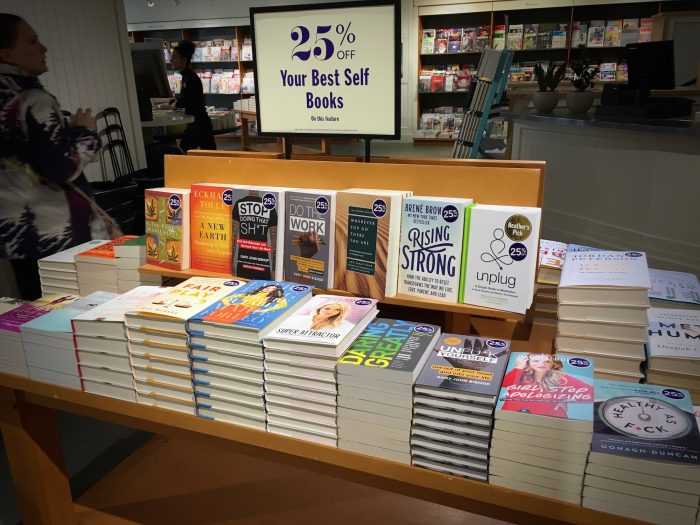It happens every year. In the doldrums between Christmas and New Year’s, when I’ve no idea what day of the week it is and I’m stuck in that mild, post-holiday letdown, I remember: the New Year is coming! It’s resolution time! And I crack the spine of my new planner while alternating between Big Dreaming and trying to stay realistic. Some people hate the whole concept, and a lot of the criticisms are fair. No, you don’t have to become a totally new person on January 1st, à la the #NewYearNewYou school of thought. Yes, it is absurd how the gym is packed for the first two weeks of January and then steadily thins out to its normal level by the end of the month. Absolutely, the marketing of all the “stuff” of reinvention is obnoxious and sometimes downright irresponsible. Few people are a bigger skeptic of the self-improvement industry than I am.
But…
I admit I still love it.
I like the reminder that even as I grow older, I always have the choice to make changes that improve me.
I love the opportunity to start again, even with a goal that has eluded me in the past.
I feel motivated by adopting on a new focus and starting fresh.
I appreciate the timing, after the dust has settled from the start of the school year and the holidays (this year was especially whirlwind for my family: two kids now in school, a house move, a trip to Europe, and family visiting over the holidays).
* * *
As a New Year’s Resolution junkie, but also a self-improvement skeptic, I’ve fallen into a pattern that has proven successful for my resolution-setting and follow-through. Here are my steps:
Consider everything. When I first start thinking about my goals for the New Year, I try not to editorialize. Every idea is valid. A true brainstorm. It all comes out.
Then, get realistic. Once I have a decent list of possible goals, I look at them and try to determine what’s actually realistic in one year. What will be most beneficial to me? I pick just two or three, across various categories: health-related, work-related, family-oriented, and/or fun.
Get into the details. It’s one thing to have a goal. It’s another to define the concrete actions I need to take to achieve it, as well as specifics I can use to measure my progress.
Create a plan. Do I need to create a daily or weekly schedule to integrate the actions I need to take towards my goals? And can I schedule in or plot out the milestones I need to hit along the way that will help with the progress monitoring?
Along with this process, I have to avoid getting swept up in looking at the New Year as an opportunity to buy something new. I probably don’t need to buy anything. Not a new book. Not a new journal. Not an app or a course. If possible, I start with whatever my endeavour is, and then determine if something’s missing (kind of like how home reno experts will say to live in the space for a while first to figure out how you actually use it before redesigning).
If I do truly need to make some sort of purchase, I consider it very carefully. First, I’ll give myself a lot of time to mull it over. Like, I’m going to look through that cookbook in the store, walk away, then ask myself if I’m still thinking about it in three days. Then I’ll read some reviews to get a sense of what other real people are staying about the product.
There are so many resources out there that claim they can help us achieve all of our goals: books (so many books!), apps, workshops, masterclasses. Some of these can be really helpful.
Many of them are just a waste of time and money. To weed out the helpful from the useless (or maybe even harmful) I ask questions like:
is the author of this book or the facilitator of this event qualified to speak on this subject?
does this resource encourage me to turn my back on people who aren’t “like minded” or who have an opposing view?
does it seem like the up-sell will never end, like there’s alway an opportunity to spend more money on this resources?
is this resource inspirational/motivational or more how-to in nature, and which do I need?
does the resource align with the steps I already set out for myself?
SEEK Safely, the non-profit my family runs to help educate consumers of self-help, has a whole list of other “Red Flags” on our website, to help weed out irresponsible self-improvement resources.
* * *
Personally, and in spite of my experience, I believe in self-improvement. I’ve learned that so much of what’s meaningful in life requires constant effort: relationships, health (mental and physical), our professions. Our lives are not static–we are constantly undergoing change or meeting new challenges and circumstances. It is rare that we can say we’ve simply mastered or achieved something and then it’s over and done with. It makes sense that every so often, we check in with ourselves and ask if there’s something we could be doing differently, something that we could to our lives to improve or even just experience life differently. This is why I fully embrace the New Year’s resolution mindset.
But there’s no doubt it’s become such a big business that the market is saturated with shiny and enticing dead weight. These are just a few ways I try to avoid the bull sh*t as I look to reach my goals.
And in case you’re curious, my resolutions for 2020:
No phone in the evening (including in bed, unless I’m reading a book on my phone)
Learn piano
Take at least one family hike per month
What are your 2020 resolutions?












Read 0 comments and reply